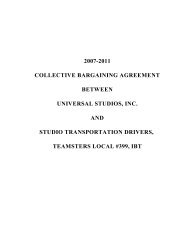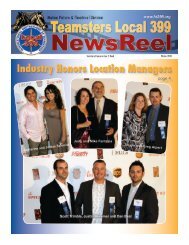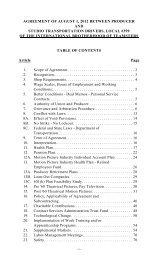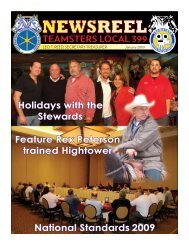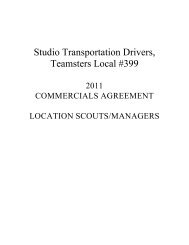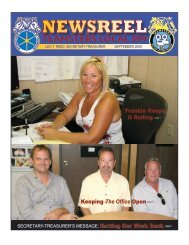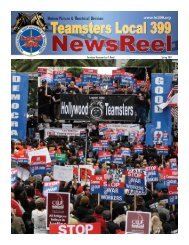Create successful ePaper yourself
Turn your PDF publications into a flip-book with our unique Google optimized e-Paper software.
<strong>Local</strong><br />
<strong>399</strong><br />
www.ht<strong>399</strong>.org<br />
<strong>Teamsters</strong> <strong>Local</strong> <strong>399</strong><br />
NewsReel<br />
Secretary-Treasurer Leo T. Reed <strong>May</strong> <strong>2009</strong><br />
Motion Picture & Theatrical Division<br />
Casting Directors Meet:<br />
Standing Together to Protect<br />
Benefits<br />
National Standards A Reality<br />
Golf Tournament Winners
Message from the<br />
Secretary-Treasurer<br />
By Leo T. Reed<br />
It is alarming that Los Angeles has become less film-friendly.<br />
This column outlines the problem and offers a more<br />
ambitious effort to attract filmmakers to the city.<br />
insert<br />
picture of<br />
Leo T. Reed<br />
from last<br />
issue<br />
Secretary-Treasurer Leo T. Reed<br />
Some Statistics<br />
FilmL.A. — the nonprofit<br />
organization that coordinates permits<br />
in the City of Los Angeles — has<br />
announced that on-location feature film<br />
and commercial production experienced<br />
steep declines in 2008. On-location<br />
feature film production posted its<br />
weakest quarter since tracking began<br />
in 1993. The year-end total is also<br />
the lowest ever. The 7,043 production<br />
days logged in 2008 are just half of the<br />
feature film category’s peak of 13,980<br />
production days tallied in 1996. Most<br />
big-budget features are no longer filmed<br />
locally.<br />
Why?<br />
Production costs are exorbitant and<br />
there are excessive restrictions. These<br />
factors are forcing LA productions<br />
to go to other cities, where they are<br />
met with open arms and incentives.<br />
The restrictions in the downtown area<br />
regarding hours, sound, and parking<br />
have made the choice of other cities<br />
more attractive to filmmakers.<br />
San Pedro is another unfortunate<br />
example. Filmmakers have been shooting<br />
at the Southwest Marine for years.<br />
It was sufficiently isolated and could<br />
accommodate the huge special effects<br />
required by producers and directors.<br />
Page 2<br />
Last month the Port Commissioner<br />
let the agreement with the managing<br />
contractor lapse and announced he is<br />
going out for rebids. This process can<br />
take three or more months, and, in the<br />
meantime, the location had been off<br />
the market. The City has reacted very<br />
slowly.<br />
Thanks to the efforts of FilmLA and<br />
Councilmen such as Bill Rosendahl,<br />
Eric Garcetti, Janice Hahn and others,<br />
the Port Commission was pursuaded to<br />
reopen the property managed by the Port<br />
until another contractor can be awarded<br />
the contract but this should have<br />
not happened in the first place. Both<br />
Rosendahl and Garcetti in particular<br />
have recognized how vital filming is<br />
to the economy of the City and have<br />
definitely been working to change the<br />
negativity towards filming in LA.<br />
A City Film Task Force<br />
Although the city has been slow to<br />
react to these problems, it is showing<br />
signs of waking up. Someone at City<br />
Hall must be noticing that the city is<br />
losing valuable film production and<br />
something must be done. A new City<br />
Film Task Force has been formed to<br />
consider long-term film policy issues and<br />
to address industry needs and concerns.<br />
There are more than 50 members on<br />
the committee, including city agencies,<br />
council offices, relevant unions, and<br />
permitting agencies. Business Agent<br />
Ed Duffy and six location managers are<br />
committee members.<br />
It held its first meeting on April 21.<br />
On the agenda was its mission statement,<br />
forming subcommittees, the frequency<br />
of meetings and possible actions. It was<br />
decided to assign problems and ideas<br />
to subcommittees, and then ask the<br />
subcommittees to prioritize tasks and<br />
return with a working plan.<br />
The committee will take slow careful<br />
steps. We need giant steps – ASAP.<br />
I get a negative feeling from the City<br />
that filmmaking is not important. This<br />
is Hollywood’s back yard, and filming is<br />
being treated as a wicked stepson.<br />
As someone said, with feature film<br />
production days being down ten of the<br />
last twelve years, we should stop talking<br />
about ‘runaway production’. It should be:<br />
‘ran-away production.’<br />
Los Angeles is simply not<br />
competitive in the marketplace. We<br />
must create an environment that brings<br />
back high-dollar film productions with<br />
the thousands of jobs they generate<br />
and the revenues they pump into our<br />
local economy. We must do something<br />
about it.<br />
Wake up, Los Angeles!
National Standards Approved<br />
For Wages, Hours,<br />
and Working Conditions<br />
National standards in the movie industry — almost two decades<br />
in the making —have become a reality.<br />
Representatives from 15 movie<br />
locals in the United States and Canada<br />
voted unanimously in <strong>May</strong> to establish<br />
model union agreements that cover<br />
wages, hours and working conditions.<br />
A longtime goal of Secretary-<br />
Treasurer Leo T. Reed, it is crucial in<br />
preventing producers from playing<br />
Teamster locals against each other and<br />
negotiating substandard agreements.<br />
Reed was able to accomplish this<br />
through his position as the IBT Director<br />
of the Motion Picture and Theatrical<br />
Trade Division.<br />
The vote was based on<br />
recommendations from the <strong>Teamsters</strong><br />
International Policy Committee. It had<br />
met the previous month to establish<br />
provisions for a model union agreement.<br />
Wages and working conditions were<br />
included, but the roster system, health<br />
and pension plans, and grievance<br />
procedures were left for each local union<br />
to determine.<br />
“The important point is that<br />
producers know that Teamster<br />
locals will refuse to sign a<br />
union contract unless the<br />
national standards are met.”<br />
— Sec.-Treas Leo T. Reed<br />
The standards were developed by<br />
using the Hollywood “Black Book”<br />
contract as a guide, with some geographic<br />
considerations.<br />
“The local unions outside the 13<br />
Western states now have minimum<br />
standards to guide them when dealing<br />
with film productions that come into<br />
their jurisdiction,” said Reed. “The<br />
important point is that producers know<br />
that Teamster locals will refuse to sign<br />
a union contract unless the national<br />
standards are met.”<br />
Representatives from the movie<br />
locals have been meeting regularly since<br />
Reed became the Director of the Motion<br />
continued on page 8<br />
Page 3
Casting Directors and Associates Meeting:<br />
Standing Together to Protect Benefits<br />
The roughly 340 Casting Directors<br />
and Associates make up an important<br />
part of the <strong>Teamsters</strong> <strong>Local</strong> <strong>399</strong><br />
membership. On <strong>May</strong> 11, members<br />
attended a general meeting designed<br />
for members of this craft.<br />
“It’s important for us to act as a<br />
united group” said Business Agent Ed<br />
Duffy. “Our strength is in our numbers.<br />
When we cooperate we can protect the<br />
benefits that members have worked so<br />
hard to win.<br />
Help Us Protect Your Benefits<br />
One of the challenges facing<br />
Hollywood <strong>Teamsters</strong> is the loss of<br />
production. Recently, the Canadian Film<br />
and Television Production Association<br />
(CFTPA) urged their members not to<br />
pay American casting directors benefits<br />
on some projects.<br />
<strong>Local</strong> <strong>399</strong> members can protect<br />
one another by standing united on this<br />
issue. If a Canadian production company<br />
says they will not pay your benefits, call<br />
Business Agent Steve Dayan or Ed<br />
Duffy immediately to discuss it.<br />
“We need to protect and value<br />
ourselves and each other by<br />
not giving away our ideas,<br />
experience and relationships.”<br />
— Features Shop Steward and<br />
Steering Committee Member<br />
Margery Simkin.<br />
Pay and Benefits for Preliminary Work<br />
on Features<br />
<strong>Teamsters</strong> don’t work for free, and<br />
we need to educate producers about<br />
this fact.<br />
“We need to protect and value<br />
ourselves and each other by not<br />
giving away our ideas, experience and<br />
relationships,” explained<br />
Features Shop Steward and Steering<br />
Committee Member Margery Simkin.<br />
“If the members of <strong>Teamsters</strong> <strong>Local</strong><br />
<strong>399</strong> stick together on this issue,” Simkin<br />
continued, “CDs and associates will be<br />
fairly compensated.”<br />
For starters, <strong>Local</strong> <strong>399</strong> staff said,<br />
protect yourself by documenting your<br />
deal in writing, with your employer’s<br />
written agreement. Each document<br />
Page 4
should include a statement that they<br />
agree to become signatory to <strong>Local</strong> <strong>399</strong><br />
(if they are not already).<br />
Again, talk to your business agent<br />
or a steering committee member for<br />
tips about getting paid for preliminary<br />
work.<br />
Health Plan Changes<br />
As well, health plan representatives<br />
pointed out that co-pays, percentages<br />
covered and coverage of maintenance<br />
prescriptions, among other things, will<br />
change in August. Members asked<br />
many good questions, so those in<br />
attendance benefited. Future meetings<br />
will include similar presentations, and<br />
while attendance isn’t mandatory, it is<br />
highly recommended.<br />
In short, as Business Agent Steve<br />
Dayan pointed out, “getting a contract<br />
is only the beginning. Everyone benefits<br />
when members give input and participate<br />
in meetings.<br />
When the next CD and Associates<br />
General Meeting is scheduled, your<br />
<strong>Teamsters</strong> <strong>Local</strong> <strong>399</strong> staff and your<br />
steering committee hope to see you.<br />
Participate<br />
Remember, our union’s strength is<br />
based on your participation. Read the<br />
job action letters you receive from <strong>Local</strong><br />
<strong>399</strong>, walk a picket line and support your<br />
fellow workers. When the union asks<br />
for your participation, it’s because a<br />
Teamster show of strength is necessary.<br />
Recent efforts resulted in local car wash<br />
employees getting paid minimum wage.<br />
If CDs and associates support others<br />
today, we can count on their support<br />
tomorrow.<br />
Steering Committee Update<br />
Megan McConnell and Janet<br />
Gilmore stepped down this year.<br />
They were thanked profusely<br />
by those in attendance for<br />
their service. A new steering<br />
committee was approved and<br />
it includes: Laura Adler, Tammy<br />
Billik, Amy Britt, Anya Colloff,<br />
Richard Hicks, Allen Hooper,<br />
Nancy Klopper, Tracy LIllienfeld,<br />
Charley Megidovich, Monika<br />
Mikkelson, David Rubin,<br />
Margery Simkin, Joe Wisniewski,<br />
and Gary Zuckerbrod.<br />
Page 5
Page 6<br />
Annual Golf Tournament Winners
Remembering Corky Randall<br />
Congratulations!<br />
Buford “Corky” randall, a Hollywood<br />
horse trainer and animal wrangler, passed away this April<br />
after a long battle with cancer. He was 80.<br />
Corky, a longtime member of <strong>Local</strong> <strong>399</strong>, was a<br />
two-time winner of the Patsy Award and Humanitarian<br />
Award in 1982 for his treatment of animals.<br />
The famed animal trainer’s lifelong love and respect<br />
for horses began as a child in his home state of Nebraska.<br />
After a bout with polio, his father Glenn Randall, Sr.,<br />
who trained Roy Rogers’ Trigger and worked horses for<br />
Ben Hur (1959), put him to work in the family business.<br />
He was galloping thoroughbred horses before grade<br />
school and had worked at Republic Studios by the time<br />
he graduated from high school.<br />
His career included feature films The Alamo (1960),<br />
The Misfits (1961), How the West Was Won (1962),<br />
Indiana Jones and the Last Crusade (1989) and The<br />
Mask of Zorro (1998). But it was Corky’s work for the<br />
The Black Stallion (1979), a film which included some<br />
of the most challenging horse scenes ever filmed, that<br />
established him as a top trainer.<br />
“Corky was a great man who had an incredible pasion<br />
for animals,” his family wrote. “He was deeply loved by his<br />
family and friends and will live on in our hearts forever.”<br />
Randall is survived by his wife, Joan Randall; son Bruce<br />
Randall (Verla); daughter Carol Morrissey ( John); sister<br />
Delores Luckman; brother Glenn Randall, Jr; and two<br />
grandchildren, Joan and John (“Randy”) Morrissey.<br />
Page 7
<strong>Local</strong><br />
<strong>399</strong><br />
TeamsTers LocaL <strong>399</strong><br />
Studio Transportation Drivers<br />
4747 Vineland avenue, suite e<br />
North Hollywood, ca 91602<br />
PRESORT STD<br />
U.S. POSTAGE<br />
PAID<br />
Los Angeles, CA<br />
Permit No. 34694<br />
Visit Your Union Web Site:<br />
www.ht<strong>399</strong>.org<br />
National<br />
standards in the<br />
movie industry<br />
— almost two<br />
decades<br />
in the making —<br />
have become a<br />
reality.<br />
continued from page 3<br />
Picture Division more than a decade<br />
ago. There has been repeated frustration<br />
at the producers’ ability to give unions<br />
“take it or leave it” offers. Under the new<br />
agreement Location Managers would<br />
be able to select locations for creative<br />
reasons, not reasons dictated by the<br />
labor costs.<br />
National standards are considered<br />
to be in the best interest of both the<br />
<strong>Teamsters</strong> and the studios. <strong>Teamsters</strong><br />
would receive appropriate pay and<br />
benefits and producers would be able to<br />
identify their transportation costs. Both<br />
sides would be spared the lengthy process<br />
of negotiating individual contracts.<br />
There would be nothing in the<br />
proposed agreement that would interfere<br />
with what is sacred in Hollywood — the<br />
right of <strong>Local</strong> <strong>399</strong> drivers to follow their<br />
equipment.<br />
“This Teamster unity gives <strong>Local</strong> <strong>399</strong><br />
more power in upcoming negotiations<br />
for drivers, location managers and<br />
casting directors,” stated Secretary-<br />
Treasurer Reed.



